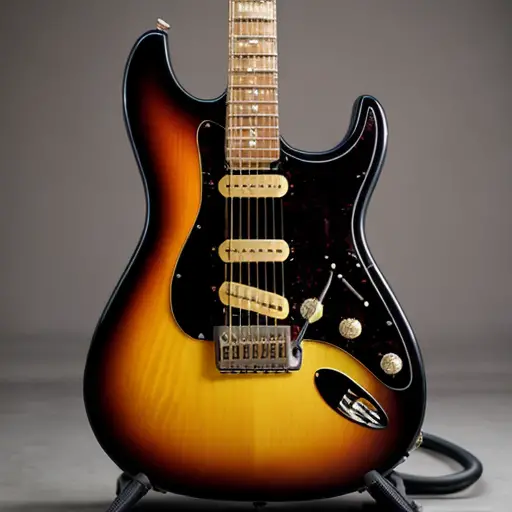Understanding the Basics of Guitar Scales
So, you've decided to embark on the noble quest of learning guitar scales, huh? Well, hold on to your pick because things are about to get a little technical up in here. Understanding the basics of guitar scales is like discovering a secret language that only the coolest musicians are privy to. But fear not, grasshopper! Mastering these scales boils down to a simple yet tortuously repetitive mantra: practice, practice, and then practice some more. It's like a twisted form of musical torture, except it's totally worth it! So grab your guitar and prepare to pluck away at those evil little boxes that haunt the dreams of every aspiring guitarist. Trust me, your fingertips will hate you at first, but the magic that awaits will make them forgive you in the end. Now, go forth and conquer those scales, brave soldier of rock!
Essential Techniques for Efficient Scale Practice
An interesting fact about practicing scales on guitar is that renowned guitarist Yngwie Malmsteen, known for his incredible speed and technique, would spend up to six hours a day solely practicing scales. This dedication and emphasis on scales helped him develop his signature neoclassical style and contributed to his mastery of the guitar.
Alright, fellow guitar enthusiasts, let's talk about everyone's favorite topic (cue collective eye-roll): scale practice! Now, I know the mere mention of scales can send shivers down your spine, but fear not, my fretboard friends, for I have some essential techniques to make your scale practice sessions more efficient and dare I say, dare I say, fun! First, embrace the power of repetition. Yes, it may feel like Groundhog Day playing those scales over and over again, but muscle memory is your friend. Keep at it until your fingers dance effortlessly on the strings! Secondly, inject some creativity into your scale practice. Throw in some unexpected bends, hammer-ons and pull-offs, like a musical game of Twister. Remember, scales can be your playground, not just a monotonous exercise. Lastly, do not underestimate the power of visualization. Close your eyes and mentally navigate the fretboard, envision yourself effortlessly shredding those scales like a guitar god. So, my fellow six-stringers, take these techniques to heart and let the scales become your secret weapon on the journey to musical mastery!
Mastering Major and Minor Scales on the Guitar

Alright folks, hold on to your picks because we're about to embark on a wild journey of mastering major and minor scales on the guitar! Now, let me just say, practicing scales may not be the hottest topic in the music world, but trust me, once you unlock the magical doors to scale mastery, you'll be strumming and shredding like a bona fide rockstar.
First things first, let's establish the importance of practicing scales. Picture this: you're hanging out with a bunch of guitar-wielding buddies, and you decide to bust out an epic solo that leaves everyone's jaws on the floor. Well, guess what? That mind-blowing solo is usually crafted using the notes from a carefully structured scale! Think of scales as the secret recipes behind those face-melting solos. So, if you ever dream of playing like Jimi Hendrix, Eddie Van Halen, or even Taylor Swift (she slays on the guitar too), it's time to get on board with some serious scale practice.
Now, you might be asking, 'How in the world do I practice scales on the guitar?' Fear not, my ambitious strummers! The best place to start is by mastering the major and minor scales, the bread and butter of guitar playing. Begin with the major scales, which have a delightful, happy-go-lucky vibe. Picture yourself frolicking through a field of sunflowers as you strum the notes of the scale, feeling the warmth and radiance of each chord progression.
However, don't let the major scales deceive you – those cheeky little rascals have their darker alter egos called the minor scales. These scales are more like that brooding loner with a hint of mystery, adding depth and emotion to your playing. Imagine yourself locked away in a velvet-curtained room, surrounded by candlelight, as you dive deep into the melancholic beauty of the minor scales.
But how do we actually practice these scales, you ask? Well, strap on your guitar, because this is where the real fun begins! Start by memorizing the pattern of each scale, understanding the intervals between the notes. Once you've got that down, speed up your practice by using a metronome, setting it to a comfortable tempo at first and gradually increasing it to challenge your fingers' dexterity. You'll soon find yourself playing scales at lightning speed, earning the admiration of fellow musicians and random woodland creatures alike.
Of course, don't forget to add your own personal flair. As you become more comfortable with scales, experiment with different rhythms, note patterns, and even bend and slide techniques. Make those scales your own, showcasing your unique style and humor (don't be afraid to throw in a sly musical joke or two – guitarists always appreciate those). Remember, while scales lay the foundation, it's the way you interpret and express them that makes you stand out from the crowd.
So, aspiring guitar virtuosos, let this be your call to arms! Unleash the beast within and embark on the noble quest of mastering major and minor scales on the guitar. Embrace the beauty of these musical building blocks, explore their hidden intricacies, and soon you'll find yourself igniting stages and wowing audiences with your incendiary licks. So, grab your guitar, crank up the amp, and get ready to conquer the world, one scale at a time! Rock on, my friends!
Beyond the Basics - Exploring Pentatonic and Blues Scales
A fun fact about practicing scales on the guitar is that it not only helps improve your technical skills and dexterity on the instrument, but it can also train your brain to think more creatively while improvising or writing music. By mastering scales and understanding their musical patterns, you can easily explore different melodic ideas and create intricate guitar solos or catchy riffs. So, in addition to being a foundational exercise, practicing scales can also unlock your inner musical genius!
So, you've finally mastered the basic scales on your guitar? Congrats, my friend! But let's face it, scales can get a little boring if you don't add some zest to them. It's time to go beyond the basics and delve into the intriguing world of pentatonic and blues scales. These bad boys will take your playing to another level, making you sound like a rock god or even a blues legend. Just imagine those screaming solos and soulful bends! But hey, don't get overwhelmed. Start slowly and practice these scales until they become as natural as inhaling oxygen. And don't forget to pepper in your own creative flair because, hey, who wants to sound exactly like everyone else? Now go forth, my fellow axe-wielder, and conquer the guitar scales of the universe! Or at least the pentatonic and blues ones.


